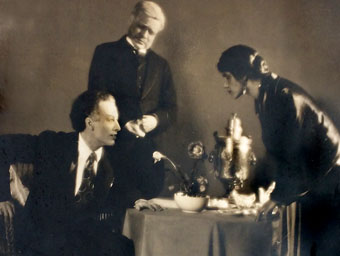100 Years of the Cornish Theater
Department
Theater Department Centennial Arrives: Why It's
a Big Deal
 |
| Chicago Little Theatre,
Maurice Browne (seated) and Ellen Van Volkenburg in Shaw's The Philanderer with Edward Mouscuian; c1912. Photo courtesy of the University of Michigan
Library (Special Collections Library), from the Ellen Van Volkenburg and
Maurice Browne Papers. |
In 1918, Nellie Cornish invited
a married couple, English poet Maurice Browne and
American actress Ellen Van Volkenburg, to found
a theater department at her school. When they accepted,
it was an astounding coup for the school, especially
since Cornish was but four years old at the time.
The Brownes were famous across the US as the founders
of the Chicago Little Theatre, the flagship company
of an art theatre movement in America.
Background: The Rise of Modernism
In Europe at the beginning of the last century, an artistic revolution was well
underway. Realist dramas had developed a following which produced what we have
come to call the Modern Theater. Its playwrights are now recognized as giants
of the art, including Ibsen, Strindberg, Shaw, Chekhov, and Gorky. Serious
attempts at poetic dramas were brought to the stage by such writers as Maeterlinck,
Synge, Yeats, and Oscar Wilde, the latter doubling as a great comic writer.
Directors such as Stanislavski and Meyerhold rethought how the actor should
work and the audience should relate to the play.
READ ON >